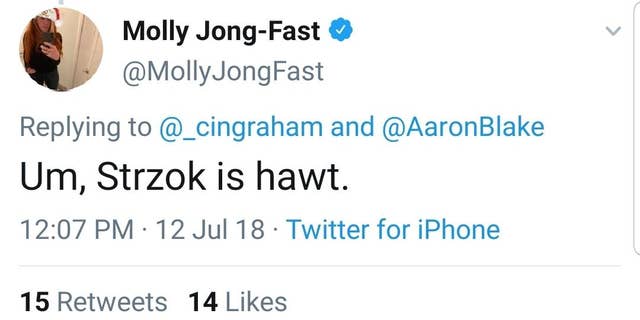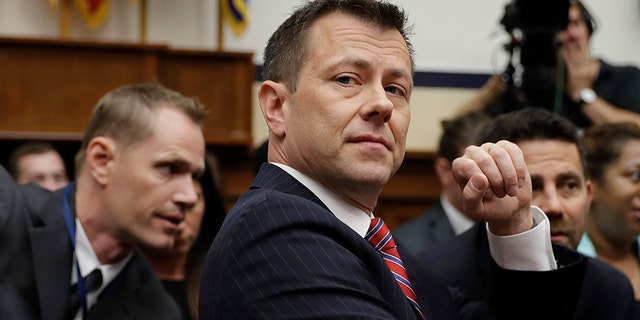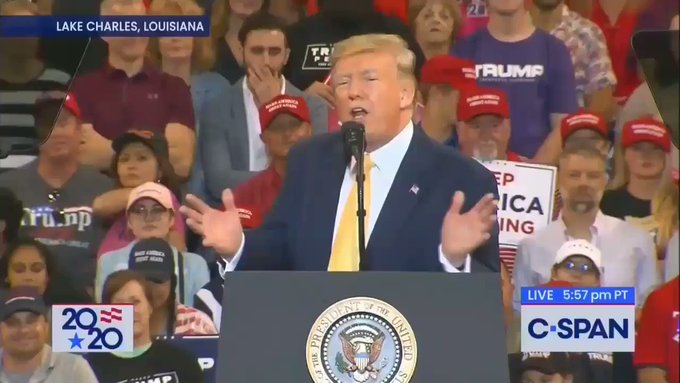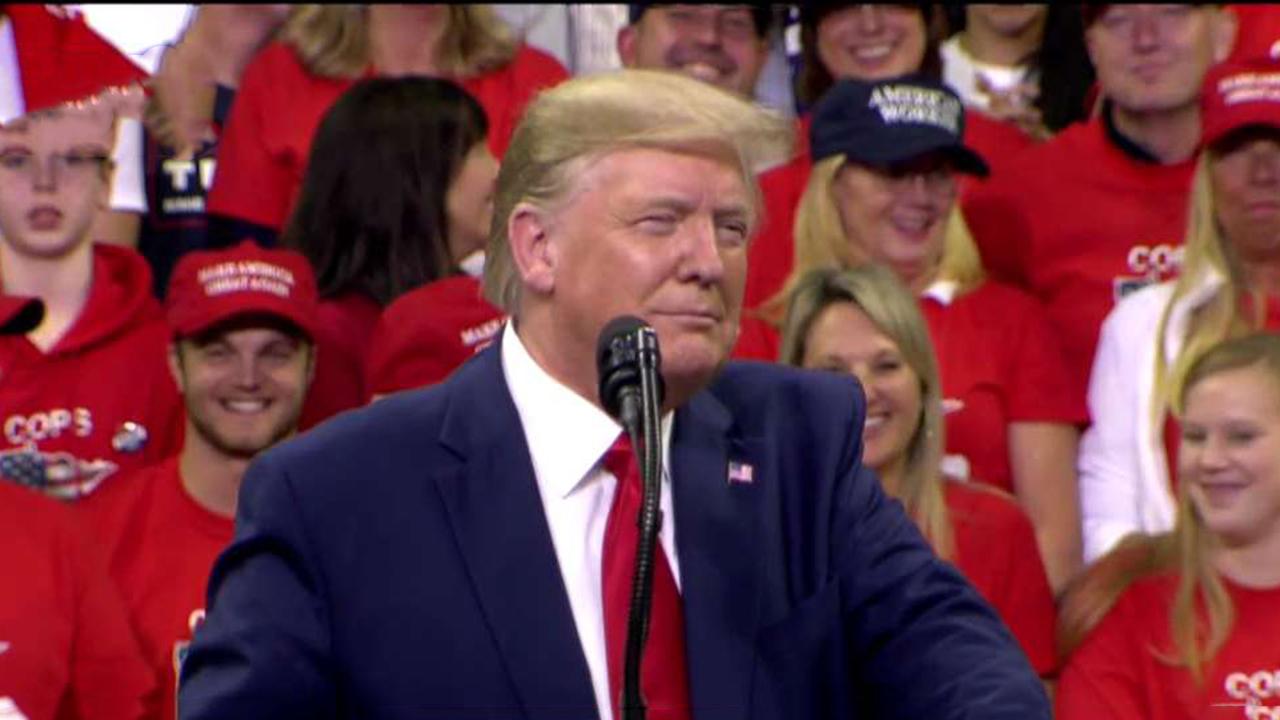
“Honestly, his demeaning fake orgasm was really the straw that broke the camel’s back."
With those striking words in an interview published late Sunday, Lisa Page, the ex-FBI lawyer who carried on an extramarital affair with former FBI head of counterintelligence Peter Strzok as the two exchanged anti-Trump text messages, said she was breaking her silence.
The 39-year-old Page was referring to Trump's comments about her and Strzok at an October rally. During the event, Trump performed a passionate, dramatic reading of Strzok and Page's August 2016 text messages, including Strzok's conspicuous promise to Page that "we'll stop" Trump from becoming president. At the time, Strzok was overseeing the Hillary Clinton email investigation and the probe into the Trump campaign.
At one point, Trump screamed out, "I love you, Lisa! I love you so much! Lisa, she's going to win one-hundred-million-to-nothing. But just in case she doesn't win, we've got an insurance policy!" (Conservative commentators have disputed that Trump was mimicking an orgasm.)
Page spoke exclusively to The Daily Beast Sunday in a highly sympathetic profile authored by Molly Jong-Fast, who called Strzok "hawt" in a tweet last year. In the interview, Page said Trump's remarks had forced her to confront the president publicly.
"I had stayed quiet for years hoping it would fade away, but instead it got worse,” Page said. “It had been so hard not to defend myself, to let people who hate me control the narrative. I decided to take my power back.”
The interview comes just days before a widely anticipated new report from DOJ Inspector General Michael Horowitz into possible FBI misconduct is expected to be released Dec. 9. Horowitz has reportedly found that an unidentified lower-level FBI lawyer falsified a key document used to obtain a secret surveillance warrant against a former Trump adviser. But, Page claimed that Trump's "fake orgasm," and not the pending IG report, was the reason she decided to come forward.
Page continued: “It's like being punched in the gut. My heart drops to my stomach when I realize he has tweeted about me again. The president of the United States is calling me names to the entire world. He’s demeaning me and my career. It’s sickening.”
Separately, Page tweeted, "I'm done being quiet." In her interview, Page went on to call the president's remarks "intimidating."
“But it's also very intimidating because he’s still the president of the United States," Page said. "And when the president accuses you of treason by name, despite the fact that I know there's no fathomable way that I have committed any crime at all, let alone treason, he's still somebody in a position to actually do something about that. To try to further destroy my life. It never goes away or stops, even when he’s not publicly attacking me.”
The president's attacks, Page said, affected her day-to-day life.
“I'm someone who’s always in my head anyway – so now otherwise normal interactions take on a different meaning," Page complained. "Like, when somebody makes eye contact with me on the Metro, I kind of wince, wondering if it’s because they recognize me, or are they just scanning the train like people do? It’s immediately a question of friend or foe? Or if I’m walking down the street or shopping and there’s somebody wearing Trump gear or a MAGA hat, I’ll walk the other way or try to put some distance between us because I’m not looking for conflict. Really, what I wanted most in this world is my life back.”
Page insisted that when she was assigned to the Clinton email probe, she knew the "case was going to get picked apart" and that "Director [James] Comey was very clear he wanted this completed as soon as humanly possible and outside of the political environment. So there was a real focus to get it done before the conventions that were happening that summer. And so that’s what we did.”
However, as the FBI was preparing to interview Clinton at her home at the close of the email probe, Page sent Strzok a text message that suggested she was concerned about the political impact of the investigation.
“One more thing: She might be our next president,” Page wrote to Strzok on Feb. 24, 2016. “The last thing you need us going in there loaded for bear. You think she’s going to remember or care that it was more doj than fbi?”
“Agreed….” Strzok responded.
Horowitz, the DOJ inspector general, noted in an initial report last year that Strzok and Page's anti-Trump texts were "not only indicative of a biased state of mind but, even more seriously, implies a willingness to take official action to impact the presidential candidate’s electoral prospects.”

Comey's firing shortly after Trump took office, Page said, was "totally within the authority of the president," but at the same time was "unprecedented and unimaginable given the circumstances."
“It was horrible,” Page said. “It was a devastating moment at the FBI. It was like a funeral, only worse, because at least when someone dies, you get to come together and celebrate and talk about that person. He was still alive. But he was inaccessible to us. It jolted the ranks and the investigation. It was so abrupt. He was there one day and gone the next. ... The president fired him with the knowledge that, of course, we were investigating Russian contacts with his campaign. I mean, it just gave the aura of an obstructive effort.”

FBI Deputy Assistant Director Peter Strzok is seated to testify before the the House Committees on the Judiciary and Oversight and Government Reform during a hearing on "Oversight of FBI and DOJ Actions Surrounding the 2016 Election," on Capitol Hill, Thursday, July 12, 2018, in Washington. (AP Photo/Evan Vucci)
Page said that when internal DOJ investigators said she was under investigation for anti-Trump text messages, she had no idea what they were talking about -- and maintained, as Strzok has, that she is capable of separating her personal life from work.
“At the end of July in 2017, I am informed by the DOJ Inspector General's office that I’m under investigation for political text messages and honestly, I have no idea what they're talking about,” Page said. “I have no recollection. And initially they’re very coy about it. They don’t tell me much about it. I don't have the first clue what they're talking about. What I do know is that my text messages will reveal that I had previously had an affair. I’m overwhelmed by dread and embarrassment at the prospect that OIG investigators, Andy [McCabe], and my colleagues, now know or could learn about this deeply personal secret.”
Last month, the Department of Justice released documents outlining a slew of "security violations" and flagrantly "unprofessional conduct" by Peter Strzok — including his alleged practice of keeping sensitive FBI documents on his unsecured personal electronic devices, even as his wife gained access to his cellphone and discovered evidence that he was having an affair with Page.
Although Strzok claimed to have "double deleted" sensitive FBI materials from his personal devices, his wife nonetheless apparently found evidence of his affair on his cellphone — including photographs and a hotel reservation "ostensibly" used for a "romantic encounter." Strzok didn't consent to turning over the devices for review, according to the DOJ, even as he acknowledged using Apple's iMessage service for some FBI work.
"[My wife] has my phone. Read an angry note I wrote but didn't send you. That is her calling from my phone. She says she wants to talk to [you]. Said we were close friends nothing more," one of Strzok's text to Page read, according to the filing.
"Your wife left me a vm [voicemail]. Am I supposed to respond? She thinks we're having an affair. Should I call and correct her understanding? Leave this to you to address?" Page responded. Strzok's wife allegedly threatened to send Page's husband some of the photographs from Strzok's phone.
Strzok then wrote, "I don't know. I said we were [] close friends and nothing more. She knows I sent you flowers, I said you were having a tough week."








No comments:
Post a Comment